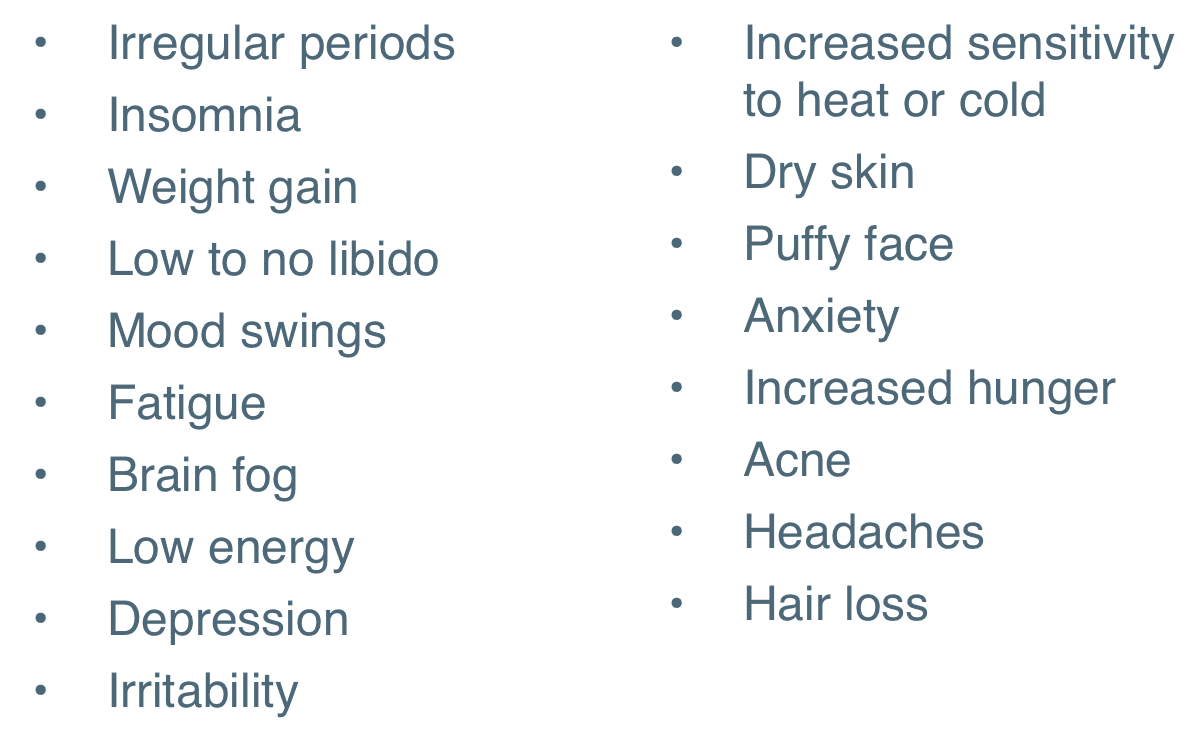Perimenopause fatigue and more? Is there anything more to tell me?
Well, yes.
Are you feeling off? Have you been feeling tired but aren’t sick? Are you having difficulty sleeping at night? Have you been caught falling asleep on the desk at work or in the car while waiting for kids? Are you having food cravings and getting thick around the middle?
Is it all making you feel a little crazy? You are not alone and you’re not crazy. Many, if not most, American women find themselves here at some point in their lives. When they do, they have two choices:
- Reach out for help
- Struggle through alone
More than likely, there’s a treatable, underlying condition that’s causing these symptoms. The question is, which one? There are several other possibilities than just perimenopause to explain these symptoms. Today we’ll focus on the three most common reasons for your fatigue.
Perimenopause Fatigue
Wait! Before you skip this one because “that couldn’t possibly be it,” take a moment and pause. If you think you’re too young to experience menopause symptoms, think again. Are you in your late 30s, 40s or early 50s? The fatigue, mood swings, and food cravings could be perimenopause. But what’s perimenopause?
Perimenopause is the transitional period of 7-10 years that leads up to menopause. You’re not in menopause until your body has stopped making estrogen and you’ve been menstrual period-free for one year. The symptoms that come along with perimenopause include:

Each woman’s body is different, so you may not experience all of these symptoms. If you’re fortunate, you won’t experience any of them. But if you’re trying to figure out why you’re so tired all the time, and you’re also having any of these symptoms, then the root cause could be perimenopause.
Diagnosing perimenopause isn’t as simple as diagnosing some other conditions. Typically, a doctor will look at your symptoms and then run blood tests to check your estrogen, progesterone, and testosterone levels. They then compare your results to a set of standards that determine when a woman’s hormone levels are near or in the menopause range.
Adrenal Fatigue
Have you heard this term thrown around to describe someone who feels tired all the time? Other names for “adrenal fatigue” include HPA axis dysfunction or, simply, adrenal dysfunction.
In adrenal fatigue, chronic stress causes your adrenal glands to overproduce stress hormones like cortisol. Eventually, your system finally crashes and leaves you feeling depleted.
Why does this happen? Not everything in the body is a so-called renewable resource. Pregnenolone, a steroid made from cholesterol, is one of those resources that you only have as much as you have. If you run out, there’s no more.
After it’s released, pregnenolone travels to various glands in your endocrine system. There it makes hormones like progesterone, estrogen, and cortisol. When you’re under stress, pregnenolone creates cortisol. If it’s being used all the time to make cortisol, then it’s not being used to produce estrogen and progesterone. Now your hormones are all out of whack. That’s why many of the symptoms of adrenal fatigue are similar to those of perimenopause.
- Insomnia
- Feeling wired but tired
- Irritability
- Cravings for sugar, carbs, salt, and/or fat
- Weight gain around the abdomen
- Anxiety
- Depression
- Low immune system
- Low libido
- Mental fog
- Difficulty concentrating
- Digestive issues
If you’re thinking you need to discuss possible adrenal fatigue, contact us for a consultation today.
Underactive Thyroid (Hypothyroidism)
Your thyroid is a small, butterfly-shaped organ located just below your Adam’s apple. Even though it’s a tiny organ, it plays a significant role in how your body functions. It regulates your weight, metabolism, energy, body temperature, mood, bowel function, and skin and hair growth.
The thyroid gland’s primary function is to absorb iodine that enters your body via food, and combine it with an amino acid to create thyroid hormones. When functioning normally, you can’t feel the thyroid under the skin. If your thyroid is enlarged, meaning that you can feel or see it, then you may have underlying thyroid issues.
If your thyroid isn’t producing enough thyroid hormones, you may experience fatigue as well as a host of other symptoms including:
- Sensitivity to cold
- Weight gain and/or difficulty losing weight
- Constipation
- Sadness/depression
- Dry hair/hair loss
- Weakness
Your doctor can diagnose thyroid issues with a simple blood test that measures the various thyroid hormones in your body. Sound familiar?
There’s a pattern here.
Extreme Fatigue in Women – Why do these conditions look so similar to each other?
Because they’re caused by a hormone imbalance. If you’re wondering if you could have more than one of these conditions at the same time, the answer is YES!
Hormones interact with each other, and if one gets out of whack, then others may follow.
The good news is that once the imbalance is diagnosed, there are plenty of treatment options. BHRT is one of the most popular. The course of treatment will depend on which hormones are too low. It might take a little time to land on the diagnosis because you have to schedule blood tests at certain times of the month. It may also take you and your doctor some time to tweak the treatment plan and get your body back into balance. But once you’re there, the results are worth it!
Get Your Energy Back with the Right Perimenopause Fatigue Treatment
We understand how challenging it can be to get to the root cause of your perimenopause fatigue. That’s why our world-class Directors of Integrative Wellness developed the NAVA Method. Want to learn more about how the NAVA Method can help you get back to your best self?
Contact us for a consultation today!
